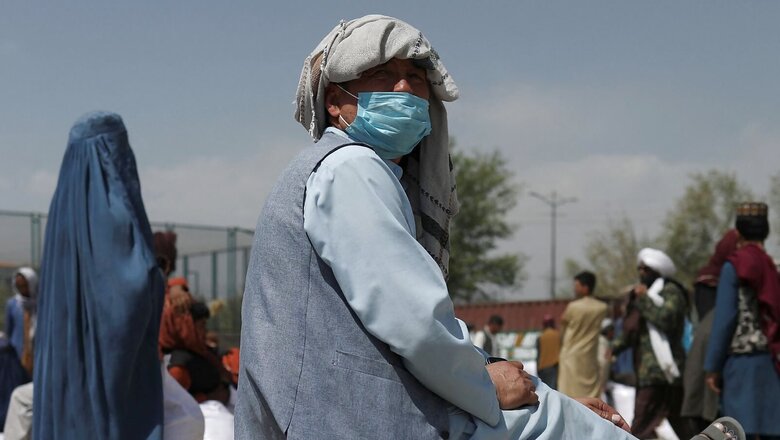
views
When the Taliban came to power in Afghanistan, China welcomed the move. China was one of the few countries establishing friendly relations with the Taliban government. There have been multiple levels of cooperation between the two nations. The Third Foreign Ministers’ Meeting on the Afghan issue among the neighbouring countries of Afghanistan and the First Meeting of ‘Neighboring Countries of Afghanistan plus Afghanistan’ Foreign Ministers’ Dialogue in Tunxi, Anhui Province, were held in March. Chinese foreign minister Wang Yi chaired the meeting, calling for the diplomatic recognition of the Taliban government in Afghanistan. He said the interim Afghan government had made efforts to stabilise the situation, and the country achieved some results. He further said no country should become a failed country and be excluded from the global community.
However, there is a stark difference between China’s words and actions regarding its policies in Afghanistan. China’s security and economic worries in Afghanistan add to China’s woes. What might seem like a smooth-going relationship between the two countries has several layers.
Security and Economic Anxieties
China’s primary concern has been that Uyghur groups such as the Turkistan Islamic Party (TIP) and other terrorist groups like Tehrik-i-Taliban Pakistan (TTP) might receive support in Afghanistan. China’s concerns were justified because the TIP emerged as a more powerful force than its predecessors during the Syrian civil war. It also had a presence in Afghanistan. The return of jihadists from northern Syria caused China alarm.
Although the presence of the TIP in Afghanistan is less significant than in Syria, there were still members of the organisation fighting in support of the Taliban. Uyghur militants have enjoyed a place of refuge in Taliban-controlled regions for several years.
Due to the terrorist attacks in Xinjiang and Pakistan, China became a target of militant organisations. After the Taliban takeover, there was a suicide bombing attack in Kunduz on October 9, 2021. The twist was that the suicide bomber was an Uyghur. Islamic State-Khorasan claimed responsibility for the attack. The Chinese government had expressed shock and despair at the incident. The highly symbolic character of the most recent assault aroused fears in China that the Taliban were not keeping their pledges, particularly preventing those fighting for Uyghur interests from seeking refuge in Afghanistan. In addition to this, Chinese nationals have been repeatedly attacked in Pakistan. The latest attack was on April 26, when three Chinese teachers were killed near a Confucius institute.
Since the last time, the Taliban were in power, China has been concerned that Afghanistan might become a haven for extremist organisations threatening China. There are no chances of a direct spillover of terrorist groups from Afghanistan or other countries to China’s Xinjiang region due to strict border restrictions in China. However, there is a sense of fear and anxiety in China. Incidents such as the terrorist attack in Kunduz last year might have only heightened this sense of discomfort.
The security situation has also hampered China’s economic goals in Afghanistan. China indicated a desire to expand its multibillion-dollar BRI into Afghanistan after the Taliban’s August takeover, stating that the Taliban felt the initiative would promote growth and prosperity in the war-torn nation and the surrounding region. Chinese Foreign Minister Wang Yi stated in March 2022, during a meeting with Afghan Foreign Minister Amir Khan Muttaqi, “China is also willing to promote the extension of the China-Pakistan Economic Corridor (CPEC), a central component of the Belt and Road Initiative (BRI), to Afghanistan, thereby making Afghanistan a hub for regional connectivity.”
Afghanistan is home to copper reserves, iron ore, and rare earth minerals coveted for their use in electronic products such as lithium, crude oil and natural gas. Last November, five Chinese firms with special visas came to Afghanistan to perform on-site inspections of possible lithium projects. However, these projects, which have seemed promising, have proved tricky for China to attain so far.
In 2008, a group of Chinese firms signed a 30-year lease on Mes Aynak, the biggest copper project in Afghanistan. To this day, 13 years later, no construction has begun on the mining project. This results from security concerns, governmental corruption, and infrastructural limitations. China has adopted a wait-and-see approach when it comes to making investments in Afghanistan.
Assurance Through Meetings
There has been cooperation between the two nations even before the Taliban takeover of Afghanistan. In a high-profile meeting with Taliban leaders in Tianjin, China’s foreign minister Wang Yi said Beijing was expected to “play a key role in peaceful reconciliation and rebuilding in Afghanistan”. In addition, he had expressed his desire that the Taliban should clamp down on the East Turkestan Islamic Movement, which he had described as a “direct danger to China’s national security”. Moreover, the Taliban delegation had guaranteed China that the organisation would not let Afghanistan be used as a base for planning against another nation.
Differences in Words and Actions
According to Xinhua News, China had declared a contribution of 3 million doses of vaccinations and other medical supplies since the Taliban’s takeover. China had also delivered $31 million of emergency aid, including food, winter supplies, vaccinations, and medications, to Afghanistan to overcome its present challenges. However, except for medical and food supplies, there have not been a lot of positive reinforcements from the Chinese side to Afghanistan.
There has not been a concrete step from China to recognise the Taliban government. Although Wang Yi mentioned it during the meeting in March, it is unlikely that China would go ahead as it would be the only country to do so.
The Chinese media has been divided on China engaging with the Taliban. There is a hope among social media users that the war-torn country would benefit from China if it is a part of the BRI and other Chinese investments in the country. However, certain netizens criticised the Taliban for educating men and women in separate classes. They said the nation would go back to the dark ages of secularism. Some tried to defend the Taliban’s actions by saying that the quality of education did not differ and it was the need of the hour to make this segregation to maintain women’s safety. Other netizens expressed concern over the future repercussions of terrorist activities in Afghanistan. Fearing for Chinese lives after the many bombings in Pakistan, netizens also deemed Afghanistan and Pakistan unsafe for Chinese citizens.
Another factor is Pakistan. China has come to depend on Pakistan over the years, starting from the China-Pakistan Economic Corridor (CPEC) and Pakistan’s aid in combating security concerns relating to Uighur groups. In addition, Pakistan has always had high stakes in the politics of Afghanistan. After the Taliban takeover, China’s dependence on Pakistan has only grown. In the mediation processes in Afghanistan, China has to take a route through Pakistan to get involved. Although this might not be bad for China, reliance on any other country might be uncomfortable for the aspiring superpower.
Finally, with the zero-Covid strategy of China and growing Covid-19 cases, there is a question about Xi Jinping’s handling of the situation and his leadership in general. Whereas China is looking to expand its influence worldwide, with the policies of zero-Covid, China might be shutting itself from the outside world.
Swayamsiddha Samal is a researcher in China Studies. The views expressed in this article are those of the author and do not represent the stand of this publication.
Read all the Latest News , Breaking News , watch Top Videos and Live TV here.




















Comments
0 comment